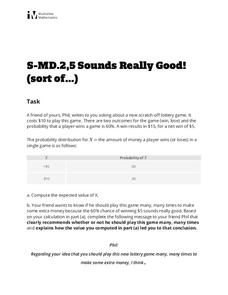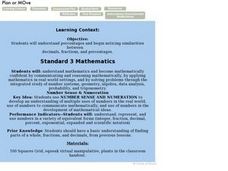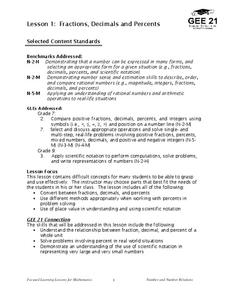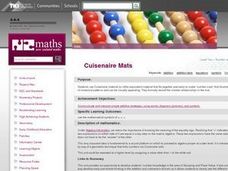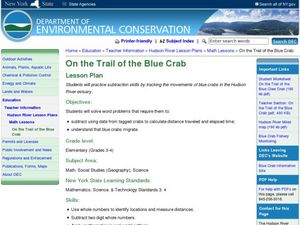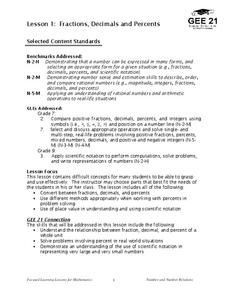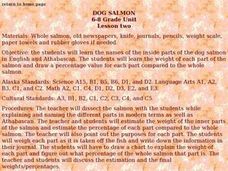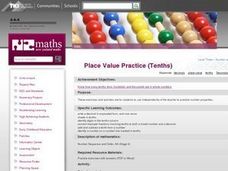Curated OER
Smallest to Largest: Decimals to the Tenths Place
Dealing with decimals in your fourth grade class? Make them easy to understand with a straightforward worksheet, which instructs youngsters to put groups of decimals in order from smallest to largest. A great way to review place value...
Curated OER
A Fibonacci Primer
Upper graders explore the Fibonacci sequence. They examine the characteristics of the Fibonacci sequence, list the properties of the sequence and determine how it connects to Pythagorean Triples. Related thinking questions are included.
Curated OER
Naming Fractions
Early learners investigate fractions and review the definitions of numerator and denominator on the chalkboard. They complete a "Naming Fractions" worksheet which is included in the lesson.
Curated OER
Properties of Real Numbers
In this Algebra II worksheet, students classify numbers by naming the subset or subsets of the real numbers to which it belongs. The two page worksheet provides explanation and examples in addition to ten practice problems. Solutions are...
Curated OER
Sounds Really Good! (sort of...)
Your friend Phil wants to know if he should play the lottery. Have your class use the given data to compute the expected value and explain to Phil what he should do and why. This handout is ideal for a quick assessment of skill and...
Curated OER
Graphing Calculator Activity: Multiplying and Dividing Mixed Numbers
In this graphing calculator worksheet, students explore necessary steps to multiply and divide mixed numbers using a graphing calculator. In groups, students measure objects in their classroom and write equations using their collected...
Curated OER
Extreme Elevations
Seventh graders use highest and lowest points of land elevation around the world to find the differences. Sea level is zero, so students be operating with positive and negative numbers. After students find the information on the...
Curated OER
Plan or Move
Students note the similarities between decimals, fractions and percentages. They practice converting numbers between these types. They participate in an activity as well.
Curated OER
Fractions, Decimals and Percents
Students investigate the differences when using decimals, fractions, and percents. They focus on the process of using them in real problems and how to convert them from one form to another.
Curated OER
Cuisenaire Mats
First graders use Cuisenaire rods to study the mathematical symbols =, <, > for the relationships is equal to, is less than, and is greater than. They use the rods to show visual explanations of common number combinations.
Curated OER
Investigation - Dividing a Candy Bar
Fourth graders explore dividing equally. They divide three-digit divisors by one and two digit divisors. Students work real life division problems. They examine possible solutions to each problem.
Curated OER
Using Numbers Everywhere
Kindergarteners explore various representations and uses of numbers to develop number sense. They participate in an activity and arrange patterns into groups. Students compare the sets and describe the objects in each set.
Helping with Math
Multiplying by Multiples of 10
Elementary schoolers solve six problems, multiplying by multiples of 10. They line up the numbers as shown and then check their answers online.
Curated OER
On the Trail of the Blue Crab
Third graders read the article "Blue Claw," discuss crab migration, and look at a map of the Hudson River. They complete a worksheet where they must use subtraction to determine the distance migrating crabs travel.Web links, article, and...
Louisiana Department of Education
Fractions, Decimals, and Percents
Fractions, decimals, and percents all say the same thing! Show your classes how to convert between the three forms using visual and numeric representations. Then lead them to an understanding of scientific notation.
Curated OER
Complexity Madness
Discuss different techniques for finding the area of a geometric shape, with a great visual guide. Using a real life example, learners calculate the area of a rectangle and a square.
Curated OER
Complexity Madness
After introducing the concept and formula for finding the area of a square, try this lesson. Fifth graders will use their prior knowledge to break apart various shapes in order to determine area. This lesson includes several examples,...
Curated OER
Research Lesson
Once you have introduced the concept of comparing positive fractions, use this plan to further understanding. Pupils will start mixing positive and negative fractions through various learning activities. Note: Adapt this lesson plan to...
Baylor College
There's Something in the Air
Clever! In order to compare indoor and outdoor dispersal rates for the movement of gases and particles through air, collaborators will participate in a classroom experiment. Set up a circular grid and set students on lines that are...
Dick Blick Art Materials
Painted Story Quilt
Creating story quilts is a great way to combine art, social studies and literature. Kids select a story, a published one or one of their own, to illustrate, paint on a canvas square, embellish, and mount on a felt backing.
Curated OER
Dog Salmon Lesson Two
Learners identify the inside parts of a dog salmon in English and Athabascan. They weigh each part of the salmon and determine the percentage of the whole that the part represents.
Curated OER
Place Value Practice (Tenths)
Students practice strategies solving problems with basic facts, framework, domain and early additive part-whole. They recall the compatible numbers to ten, solve problems with small numbers using a part-whole strategy and recall ten and...
Curated OER
Getting Partial
This unit introduces a number of important concepts relating to fractions. The first of these is that fractions represent parts of regions and sets and so are useful in a large variety of situations. Whole numbers are not enough by...
Curated OER
The Take-Awar Bar 1
Students use an Internet tool, "The Take-Away Bar" to solve subtraction problems by breaking them into parts. They write and solve comparison problems. Students make sensible estimates and check the reasonableness of answers. They use...




